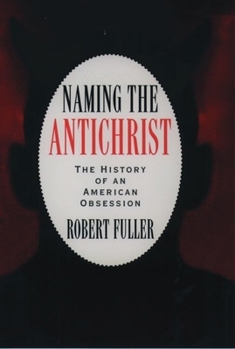Naming the Antichrist: The History of an American Obsession
Select Format
Select Condition 
Book Overview
The Antichrist, though mentioned a mere four times in the Bible, and then only obscurely, has exercised a tight hold on popular imagination throughout history. This has been particularly true in the U.S., says author Robert C. Fuller, where Americans have tended to view our nation as uniquely blessed by God--a belief that leaves us especially prone to demonizing our enemies. In Naming the Antichrist, Fuller takes us on a fascinating journey through...
Format:Hardcover
Language:English
ISBN:0195082443
ISBN13:9780195082449
Release Date:April 1995
Publisher:Oxford University Press, USA
Length:240 Pages
Weight:1.24 lbs.
Dimensions:0.9" x 6.4" x 9.5"
Customer Reviews
4 ratings
Us and Them
Published by Thriftbooks.com User , 18 years ago
Anyone familiar with Evangelical Christianity of the last forty years could probably reel off at least a half-dozen proposed candidates for the Antichrist. In Naming the Antichrist, Robert Fuller demonstrates how often crises within the nation and the American Church have precipitated the naming of religious and/or secular forces within the country as minions of the Antichrist. In so doing, he connects the theme of a satanic influence seeking to undermine the nation's status as a bastion of true Christianity forming out of the experiences of the Puritan influence in the British colonies in America and passed down as a unique element of our American heritage. Fuller begins his exposition with an overview of the history of the concept of an antichrist. His view of the Biblical texts largely assumes secular biases and is the most unsatisfying aspect of the book. However, it has little bearing on what follows and can largely be ignored. The book begins to hit home with the assumption of many Protestant Reformers that the papacy was the Antichrist predicted in Scripture. This assumption - born in the struggles of the Reformation and its aftermath - was gradually discarded by many European Protestants over time but became etched in the collective consciousness of those who left for America. The Elizabethen Settlement, with a compromise between Protestant and Catholic sensibilities, was totally unsatisfactory for the Puritans who wanted a church completely devoid of any remains of Roman ritualism. Cromwell's bloody revolution and the tyranny that followed soured the English on Puritan ideals and after the Restoration many of their negan a trek that would bring them to America. With them they brought their intense hatred of Catholics as the legendary "other" as they sought to build their "city on a hill." With no Catholics around to dread, the Antichrist rhetoric was put on a back burner but there was an inherent assumption that they were building the great Christian society free of popish influence. On the occasions that their hegemony was threatened, the natural inclination was to attribute a sinister motive with Rome as the likely power behind the nefarious plot. The ineveitable assertion of British control over the colonies with its Church and "popish" Common Prayer was, of course, an obvious source of displeasure. But even events within their own communities were seen as threats. The perception of threats from without and within engendered a sense of trepidation that could and did veer out of control when a loss of their beloved "perfect Christian society" seemed imminent. The events surrounding the Salem Witch Trials demonstrates how events that could not be explained by their categories of thought could be combined with this fear to produce tragic results. Out of this foundation came a tradition of "naming the Antichrist" as a method of closing debate, separaing "us" and "them", villifying the enemy, and protecting the societal hegemony. Wheth
Thoroughly researched, fascinating and scholarly...
Published by Thriftbooks.com User , 18 years ago
First off the reviewer who said this book reveals how "dangerous Christianity" is completely off the mark and does this book a disservice. This book is not a critique of Christian values, culture or doctrine - it is merely a well researched glimpse at the history of the "Antichrist" (as either an individual or group) throughout history from it's roots in antiquity up to the modern age. It's true that throughout history individuals and institutions have used the image and language surrounding the Antichrist to demonize (pun intended) individuals or groups of people. Today we in the 21st century can look back on this persecution through the lens of temporal ethnocentrism and deem such behavior immoral. But that's not the goal of this book. Naming the Antichrist is a sober, unbiased examination of the history of the "Antichrist" in doctrine and popular culture. It is a well researched, if somewhat dry read that is fascinating to history buffs and potentially valuable to students and other researchers. Further, anyone who is interested by the concept of the Antichrist would do well to read this book - particularly in light of our modern era's fascination with dispensationalism and it's impact on world politics. Fans of Left Behind or Hal Lindsey can brush up on the historical underpinnings of some of the concepts they weave in to their fiction. I give it four stars instead of five because it is a dry read at times. Fuller set out to write a scholarly work and succeeded.
Tells the truth that Christian conspiracies hide.
Published by Thriftbooks.com User , 25 years ago
If you want to find out just how dangerous Christianity can be, READ THIS BOOK.
Fascinating and thought-provoking
Published by Thriftbooks.com User , 25 years ago
A fascinating and thought-provoking book. A balanced and objective study of one of the most disturbing phenomenons of the 20th century. Prof. Fuller's chronological approach, starting with the early days of Christianity, immediately compels the reader to follow through the centuries and the rise and fall of the apocalyptic world-view and Christian extremism.






